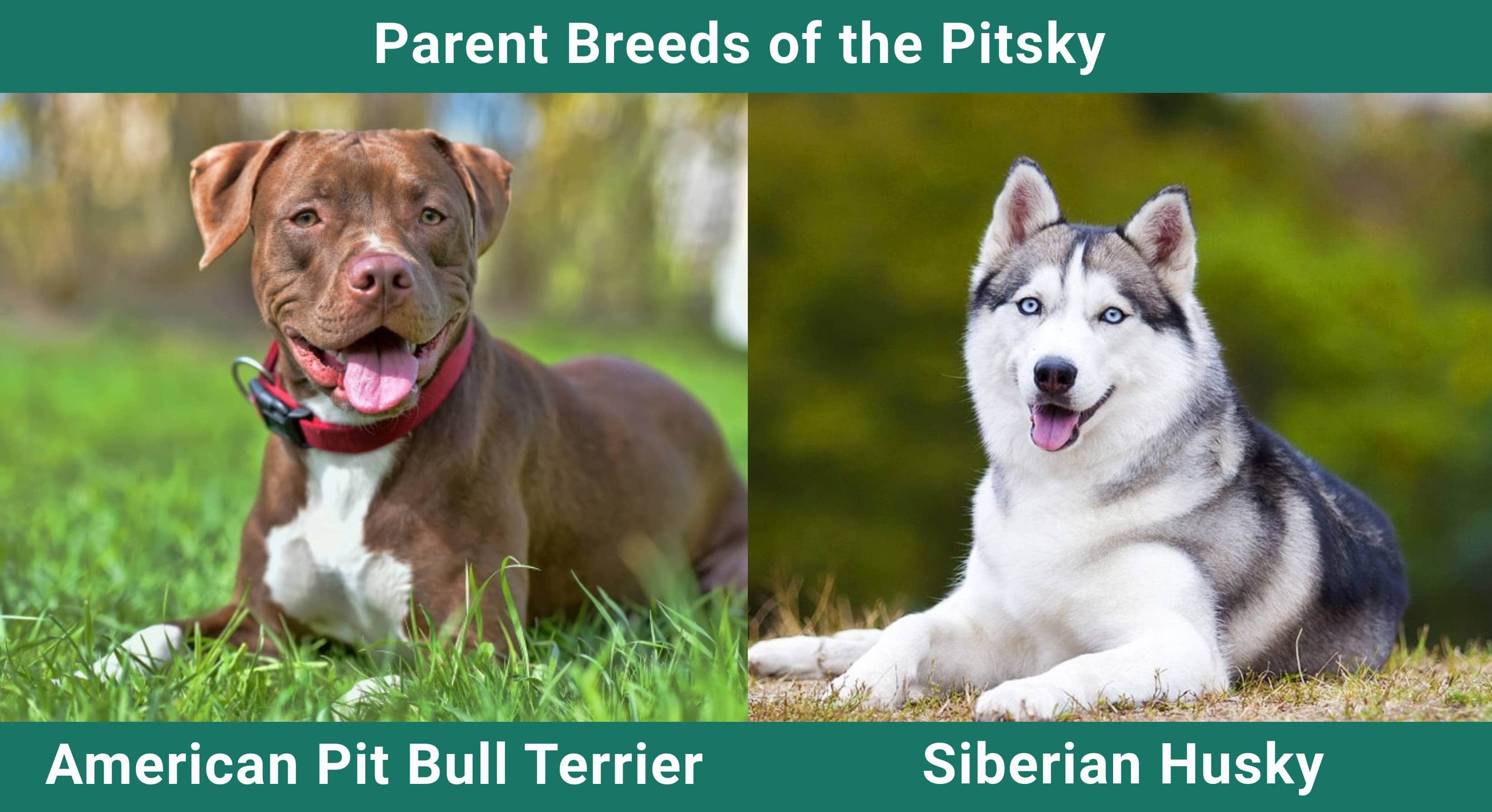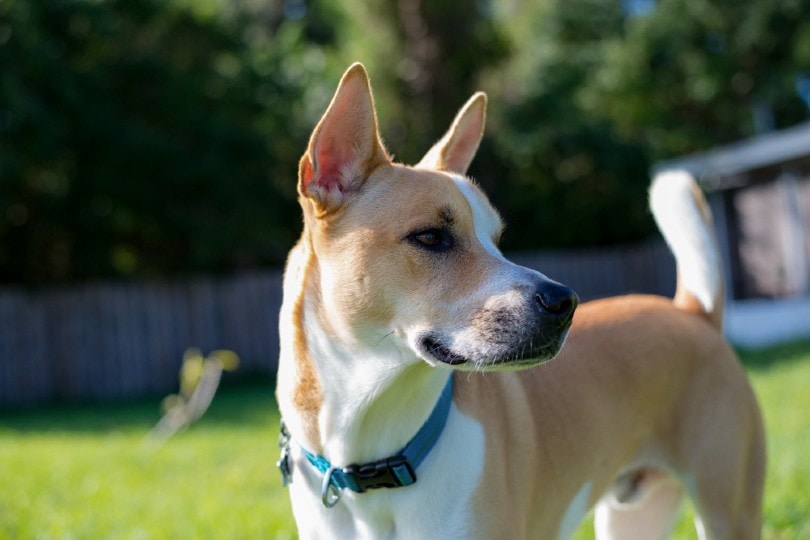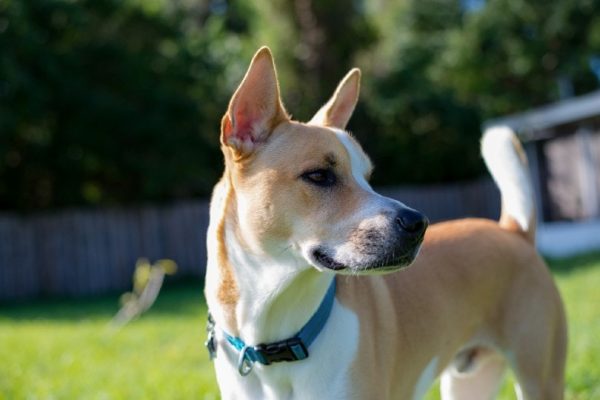Click Below to Skip Ahead
Created from American Pit Bull Terrier and Siberian Husky parents, the Pitsky is a medium-to-large mixed breed that inherits some of the best traits of the parents. Also known as a Husky/Pit mix or Pit/Husky mix, the designer dog is energetic, loyal, and well-suited to fast-paced lifestyles.
Breed Overview
Height:
16-25 inches
Weight:
30-80 pounds
Lifespan:
12-16 years
Colors:
Black, black and white, brown and white, red and white, brown, gray, brindle
Suitable for:
Families, experienced owners, active owners, temperate climates
Temperament:
Loyal & loving, intelligent, kid-friendly
Pitskies are a good choice for experienced pet parents as well as families with children. These dogs can be demanding and high maintenance with their training and energy needs, so make sure you have what it takes! Though Pitskies get along well with training and may be comfortable with other dogs, they require discipline and training to subdue some of the parent breeds’ suspicious tendencies and prey drive.
Wondering if a Pitsky is the right choice for you? Read on to find out!
Pitsky Puppies
Pitsky puppies’ availability can vary based on the pedigree of the parents and the reputation of the breeder. Mixed breeds like Pitskies don’t have registered breeders, but you can still choose a reputable breeder. Watch out for breeders that offer suspiciously low prices, offer to ship your puppy, or seem eager to give you the puppy at a young age. Puppies do best when they stay with their mothers for 9 to 12 weeks. While these puppies may seem like a deal, you could end up with a puppy prone to medical problems from poor genetics and inadequate care from a puppy mill breeding operation.
Despite the designer dog moniker, Pitskies often end up in shelters. They require a great deal of exercise to release pent-up energy and aren’t suitable for novice owners and apartment dwellers. People get these dogs for their looks or other motivations, then surrender them to shelters when they get to be too much.
Fortunately, that means you may be able to find a Pitsky in a shelter. It’s always better to adopt instead of shop, and you can give a loving Pitsky a forever home.

Temperament & Intelligence of the Pitsky 🧠
What can you expect from the Pitsky as a family pet? Learn more about the dog’s intelligence, trainability, sociability, and general temperament.
Are These Dogs Good for Families? 🏡
The Pitsky is an excellent family dog. These dogs enjoy children of all ages and display playful, affectionate, and loyal behaviors. Keep in mind that these dogs have formidable parent breeds, however, so it’s easy for them to get carried away while playing. Be sure to reinforce good manners with training and teach children how to behave appropriately around a dog.
Pitskies are also good with strangers and won’t usually hesitate to approach new people. They are protective dogs, however, so they won’t hesitate to react if they perceive danger. Pitskies aren’t guard dogs, but they will defend their owners.
Does This Breed Get Along with Other Pets? 🐶 😽
When properly trained and socialized, the Pitsky can make a good companion to other pets, including small animals. While the dog may chase a squirrel or cat in the yard, they’re typically good with other household animals. Huskies can be fierce hunters, however, so be sure to curb any chasing and hunting instincts in your pup if you have small animals, cats, or a lot of yard wildlife. Avoid play that encourages this behavior, such as playing with squeak toys, which mimic prey animals.
 Things to Know When Owning a Pitsky:
Things to Know When Owning a Pitsky:
Wondering what your Pitsky will require for food, exercise, and veterinary care? Read on to learn more.
Food & Diet Requirements 🦴
Unless there are health problems, your Pitsky shouldn’t require any special dog food formula. These dogs have high energy and need high-quality food that supports their activity level, however. Focus on quality formulas that have animal protein as the first ingredients, as well as grain-free formulas with vegetables and fruits for nutrients and energy.
Your puppy should begin with high-quality puppy food. Once your pup reaches adulthood, you can switch to an adult formula. If your dog has allergies, speak with your vet about using limited-ingredient food options to manage symptoms.
Exercise 🐕
Pitskies are energetic dogs, just like the Husky and Pit. If you plan to bring home a Pitsky, make sure you can devote the time to addressing its energy needs and provide extended periods of running, playing, hiking, or other activities.
These dogs also need mental stimulation to stave off boredom. Obedience training and entertaining dog games or puzzle toys can help your dog stay focused and interested. This breed also benefits from homes with large yards where it can run and play freely. Without adequate exercise, your Pitsky may destroy your house by chewing or other behaviors.
Training 🦮
Pitskies can learn obedience, but they need consistent training from the start. Both parent breeds can be challenging without proper training, so you must train your puppy and establish discipline to prevent behavioral problems in the future. Fortunately, these dogs are intelligent and aim to please their owners, which makes training a little easier.
Always use positive reinforcement training and teach your dog basic commands like sit, stay, and leave it. These dogs will try to become the pack leader, so stay consistent and firm in establishing your dominance in a positive, humane manner. Huskies, in particular, can be stubborn and difficult to train. If your pup inherits these traits, you may want to seek out a professional behaviorist.
Grooming ✂️
No matter which parents your dog takes after, the Pitsky will shed all year round. If you have a double-coated pup, expect near-constant shedding that ramps up in intensity during transitional periods of the spring and fall. Consistent brushing can help with shedding, but you may need to invest in a pet vacuum to keep up.
In addition to brushing your dog, you’ll also need to trim its nails weekly or every two weeks and clean its ears every two weeks. You should also brush your pup’s teeth several times a week and give it a bath every few months, as needed.
https://www.instagram.com/p/CWbCONKLHqS/
Health and Conditions ❤️
Both pits and huskies are prone to genetic conditions like hip dysplasia, allergies, eye conditions, and heart problems, meaning your pup may be as well. If you go through a breeder, get a health clearance for the parents.
You can prevent many health conditions in your dog by providing high-quality nutrition, plenty of exercise, and regular veterinary care.
- Cataracts
- Allergies
- Hip dysplasia
- Thyroid issues
- Congenital heart defects
Male vs Female
For the most part, choosing between a male or female Pitsky comes down to personal preference. Males are typically larger than females, however, and may add to the cost of food, weight-based medications, and surgery. This isn’t a huge difference, though.
Whether you choose a male or female dog, neutering or spaying is a must. This is already a mixed breed, so they shouldn’t be bred unless you are a professional. Plus, fixing your dog can prevent problems like aggression, behavioral issues, and reproductive conditions and cancers.
 3 Little-Known Facts About the Pitsky
3 Little-Known Facts About the Pitsky
1. A Pitsky’s Coat Texture Is a Toss-Up
The American Pitbull Terrier has a short coat, while the Siberian Husky has a dense double coat. The coat of the puppy depends on the dominant gene of the parent.
2. Pitskies Hate to Be Alone
Most dogs are attached to their owners, but Pitskies suffer from separation anxiety more than other breeds. Without adequate attention, a Pitsky can develop behavioral problems, aggression, destructive behaviors, or severe anxiety.
3. Pitskies Are Houdinis
Huskies are well-known escape artists and can defeat the most challenging of enclosures, including chain-link fencing. Both Huskies and Pits are excellent diggers, so the combination in a puppy means you may have a little Houdini on your hands. Make sure your home is prepared before committing to a puppy.
Final Thoughts
Born of two popular medium-to-large breeds, the Husky and the Pit Bull, the Pitsky is a lovely designer dog that’s great for families and active individuals. Like its parents, the Pitsky is lovable, intelligent, and loyal, but it requires consistent training and socialization to reach its potential. Pitskies are also energetic dogs that need tons of exercise, so they’re best for families that enjoy a good run, hike, or jog.
Related Article:
- Pitbull vs. Husky: Notable Differences (With Pictures)
- Vizsla Husky Mix: Care Guide, Pictures, Info, Traits, & More
Featured Image Credit: AllisonJ7, Shutterstock




 Things to Know When Owning a Pitsky:
Things to Know When Owning a Pitsky: 3 Little-Known Facts About the Pitsky
3 Little-Known Facts About the Pitsky




